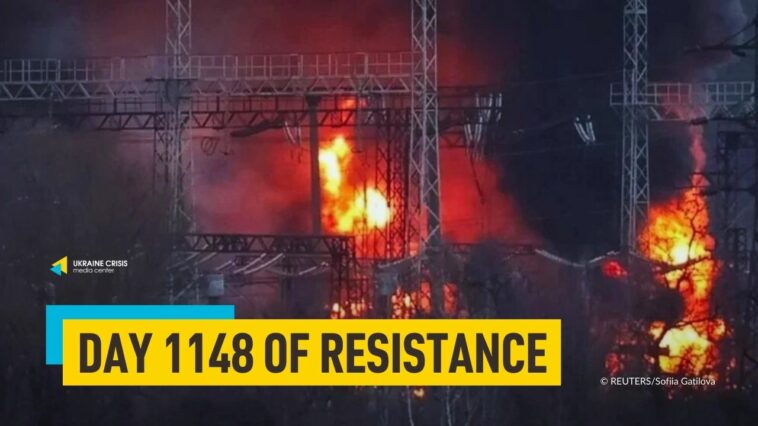Ukraine drones attack the base of a Russian missile brigade that struck Sumy. Zelenskyi responds to Witkoff’s remarks on “five territories”. Russia may end the “energy ceasefire” with Ukraine soon, ISW says.
Ukraine drones attack base of Russian missile brigade that struck Sumy
The city of Shuya in Russia’s Ivanovo region came under a drone attack on Wednesday morning, posts on local Telegram channels said. The city hosts the base of the Russian 112th Missile Brigade that launched a missile strike on Sumy on Palm Sunday that killed dozens of people.
The brigade is equipped with Iskander-M missile systems and was the target of the drone strike, Astra Telegram channel said.
Russian Telegram channels were circulating videos that appeared to show the base being struck. The attack has reportedly caused injuries.
Head of the Main Intelligence Department of Ukraine’s Defense Ministry, Lieutenant General Kyrylo Budanov, earlier said the Sunday strike on Sumy was carried out by the Russian 112th Missile Brigade and 448th Missile Brigade.
Zelenskyi responds to Witkoff’s remarks on “five territories”
Ukraine is a sovereign state and only Ukrainians can decide on the future of their country’s territories, President Volodymyr Zelenskyi told a joint news conference with NATO Secretary General, Mark Rutte, in Odesa on Tuesday.
“[Responding to your question] about the territory, Ukraine is a sovereign nation and all territories belong to the unitary state of Ukraine. Only the people of Ukraine can decide on our country’s territories. Our red lines include the recognition of any temporarily occupied Ukrainian territory as Russian. The representatives in question go beyond their competence when discussing these matters,” Zelenskyi said, when asked to comment on U.S. special envoy, Steve Witkoff’s latest statement.
In an interview on Fox News Monday night that followed his meeting with Russian leader Vladimir Putin in Moscow last week, Witkoff said the key to an overall peace agreement revolves around “five territories,” without providing more details.
Russia has been demanding full control over four Ukrainian regions — those of Donetsk, Luhansk, Zaporizhzhia and Kherson. It doesn’t fully control any of them. It illegally annexed the peninsula of Crimea in 2014.
Witkoff also said there is a “lot of detail” to work through in negotiations over a “complicated situation, rooted in some real problematic things happening between the two countries.”
Russian Foreign Intelligence Service Head Sergey Naryshkin claimed on April 15 that any future peace agreement ending Russia’s invasion of Ukraine must include terms concerning the recognition of Russia’s illegal annexation of all of Luhansk, Donetsk, Zaporizhzhia and Kherson regions.
Russia may end “energy ceasefire” with Ukraine soon, ISW says
Russia may recognize the end of the 30-day energy infrastructure strikes ceasefire soon and intensify its long-range strikes against Ukraine, the Institute for the Study of War (ISW) said in a report released on Tuesday. The paragraphs below are quoted from the report.
Kommersant asked Lavrov to comment on how neither the temporary ceasefire against energy infrastructure strikes nor the temporary ceasefire in the Black Sea are “fully in effect.” Lavrov responded, claiming “there are no such agreements,” but then proceeded to discuss Putin’s rejection of Trump’s proposed 30-day full ceasefire.
Kremlin Spokesperson Dmitry Peskov claimed on April 15 that the Kremlin would clarify the end date of the 30-day energy infrastructure strikes ceasefire with the Russian MoD and noted that “everything will depend on further orders from the Supreme Commander-in-Chief [Putin].”
Russian officials have routinely claimed almost every day since March 18 without evidence that Ukraine has violated the temporary energy infrastructure strikes ceasefire.
Russian forces may intensify long-range strikes against Ukraine in the coming days as the ceasefire comes to an end. The exact parameters of the ceasefire — including its end date — remain unclear.
Putin rejected Trump’s temporary full ceasefire on March 13, questioning whether Ukraine would be allowed to continue to mobilize forces, train newly mobilized soldiers, and receive military aid from its partners and allies and questioning the control and verification measures of a temporary ceasefire — questions which Lavrov reiterated on April 15. Lavrov attempted to blame Ukraine for the lack of a full ceasefire, claiming that Ukraine “loves to lie.”
Russian officials, led by the Russian Ministry of Defense (MoD), have accused Ukraine of violating the temporary energy infrastructure strikes ceasefire almost every day since March 29 while offering no evidence of such violations, and the Kremlin appears to be using these unsubstantiated claims to also refuse Trump’s temporary full ceasefire proposal.

